- GreenMatch
- Garden Rooms
What is a Garden Room? Find Out All the Benefits and Possibilities

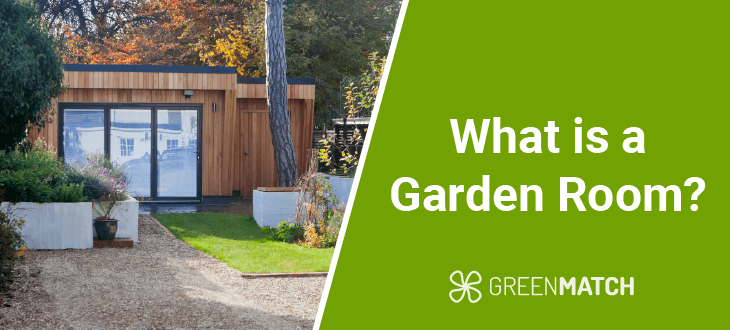
- A garden room can be used as a home office, gym or games room!
- Reduce your carbon emissions and save energy by avoiding the commute.
- Enjoy a dedicated space year-round with a well-insulated garden room made from quality materials.
Ever dreamt of having more room at home but wanted to avoid the environmental and cost implications of an extension? Well, a garden room is the answer! These versatile outbuildings are becoming popular across the country, offering a stylish and sustainable way to extend your living space.
A garden room can be anything from a dedicated home office with natural light to a cosy haven for year-round relaxation or even a private yoga studio! The possibilities are endless. In this article, we’ll explore the world of garden rooms to discover their many benefits and exciting possibilities.
What is a garden room?
A garden room is a permanent, insulated structure built in your garden, separate from your main house. Unlike a traditional shed used for storage, a garden room is designed to be a comfortable and functional extension of your living space. Typically, they can be used as a garden office, a relaxing sunroom, a dedicated hobby room, or even a guest suite – the possibilities are endless!
Garden rooms come in a variety of styles and materials, from classic timber constructions to sleek contemporary designs with expansive glass walls. No matter your taste, there's a garden room that can perfectly complement your existing home and garden aesthetic.
Why should I choose a garden room?
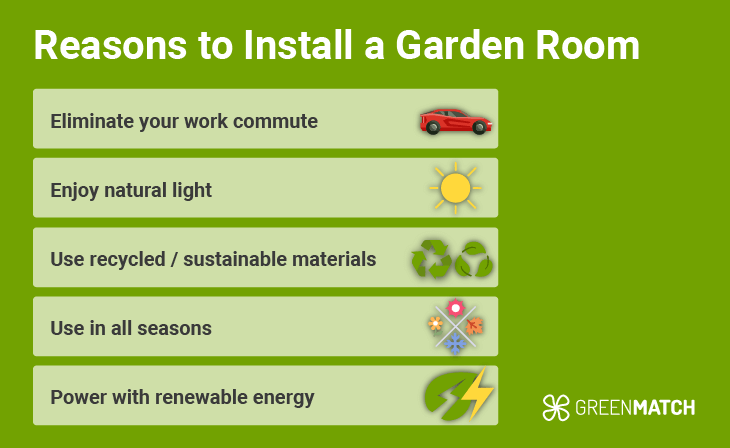
If you’re looking to create extra space in your home but are concerned about the environmental impact of a new extension or large renovation, there are many reasons a garden room could be the answer.
Garden rooms offer a surprisingly eco-friendly way to expand your space. Here's why you should choose a garden room:
- Reduced reliance on travel: Creating a dedicated space for work, hobbies, or workouts can eliminate the need for energy-intensive commutes. This cuts down on harmful emissions and saves you money!
- Natural light: Garden rooms, especially those with ample windows and glass walls, bathe your space in natural light. This reduces dependence on artificial lighting during the day, lowering your overall electricity consumption.
- Sustainable materials: Many garden room builders offer options for using recycled or sustainably sourced materials for construction, such as local FSC-certified timber, recycled steel and plastics. Roofing can also incorporate grass or wildflower seeding to provide natural insulation while benefitting wildlife. These techniques minimise the environmental impact and can align with eco-conscious living.
- Year-round enjoyment: A fully insulated garden room allows you to appreciate the outdoors comfortably throughout the year, even during colder seasons. This can reduce the temptation to crank up the heating inside your main house, promoting energy savings (particularly good if you work from home, as you avoid heating costs for the whole house!).
- Potential for renewable energy: Consider incorporating features like solar panels on the roof of your garden room. This allows you to generate clean energy to power the room itself, further reducing your reliance on grid energy.
Benefits of a garden room
In addition to the many environmental benefits, garden rooms offer a range of advantages and uses that extend beyond simply gaining extra space. Here are some of the ways they can enhance your home and lifestyle.
| Increased living space | Gain valuable extra square footage without the hassle and cost of a major home extension. This is ideal for growing families, those working from home, or anyone needing a dedicated space for hobbies or relaxation. |
| Year-round enjoyment | Extend your living space outdoors and comfortably use your garden throughout the year, regardless of the weather. |
| Versatility | The true perk of a garden room lies in its adaptability. Transform it into a space that perfectly suits your needs and interests - a home office, yoga studio, playroom, guest suite, or art studio. |
| Increased property value | A well-designed garden room can be a significant selling feature, potentially adding value to your property. Recent studies suggest as much as an 8.4% value increase as homeowner priorities have changed since the pandemic. |
| Personalised spaces | Design your dream space with considerations for size, materials, and layout to create a place that reflects your unique style and fulfils your needs. |
Garden rooms: what can they be used for?
One of the main reasons for the spike in the popularity of garden rooms is their versatility. Unlike a traditional shed, custom garden rooms are designed to be comfortable and functional. With proper planning and design, they can transform into dedicated rooms catering to a variety of needs.
Home office
Since the pandemic, many workers have had no choice but to work from various parts of their house - the kitchen, a spare room, and even from bed! It’s no surprise, then, that one of the most popular uses of garden rooms is as a home office - a dedicated space that’s quiet and built to help with focus and productivity.
As a home office, even small garden rooms can offer the following:
- More natural light, with well-placed windows
- Quality insulation for walls, floors, and roofs. Recycled cellulose or sheep's wool can be used to make this eco-friendly.
- Storage solutions and organised space.
- Soundproofing for a focused environment.
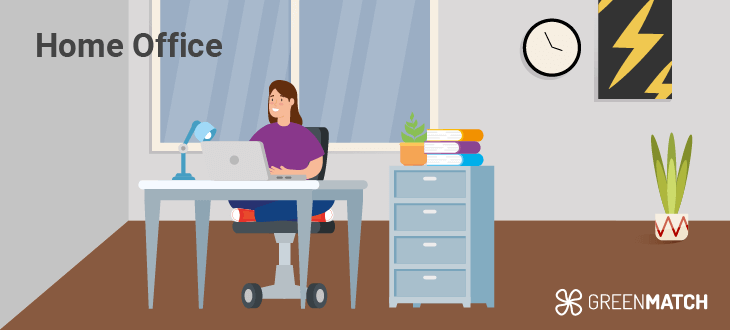
Private home gym
A home gym is a great way to avoid the commute and save money on expensive memberships. A garden room can make a perfect space to work out and can be built to tailor your needs. For example:
- Install durable and slip-resistant flooring for exercise routines. Rubber or cork flooring offers good shock absorption and noise reduction.
- Large mirrors on one or more walls can help you monitor your form and create a sense of spaciousness.
- Consider installing ceiling fans or opening windows to ensure adequate airflow.
- For certain workout routines, a small sink with running water might be a convenient addition.
- Choose moisture-resistant materials like treated wood or vinyl for walls and ceilings to withstand sweat and humidity.
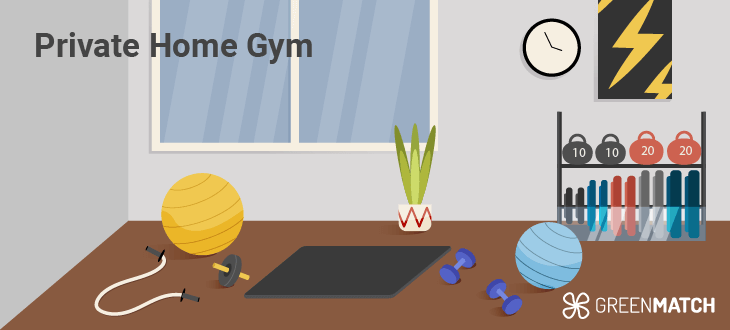
Entertainment area
When it comes to hobbies and entertainment uses, the limits really are only your imagination. If you’re into crafts, you can create built-in work benches, places to hang tools and storage options. If you would rather create a ‘den’ for relaxing or hosting friends, you can explore options to fit the area with multiple power outlets to hook up a TV and speakers or get a direct internet connection - great for those who want a gaming hub!
Some considerations for an entertainment garden room could include:
- Comfortable seating arrangements like sofas or armchairs.
- Install a sound system and a large-screen TV for movie nights or watching sporting events. Add extra pizazz with LED lighting!
- Consider installing air conditioning or a heating system for year-round comfort.
- Opt for soundproofed walls and a fully insulated ceiling to minimise noise disturbance to your main house and neighbours.
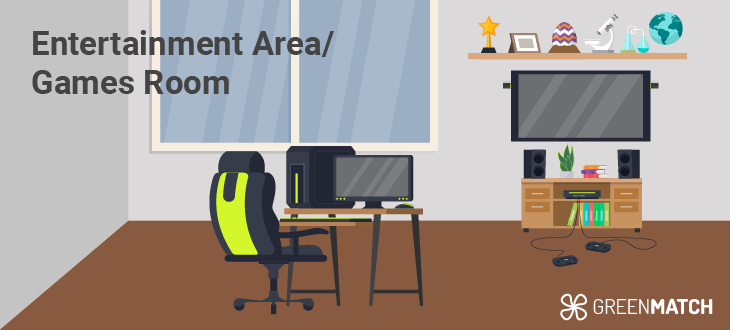
The possibilities for your garden room are truly endless! You might want to create a dedicated art studio, a tranquil reading nook, or even a children's playroom. The key is to identify your needs and tailor the design to create your perfect space.
Difference between a garden room and a conservatory?
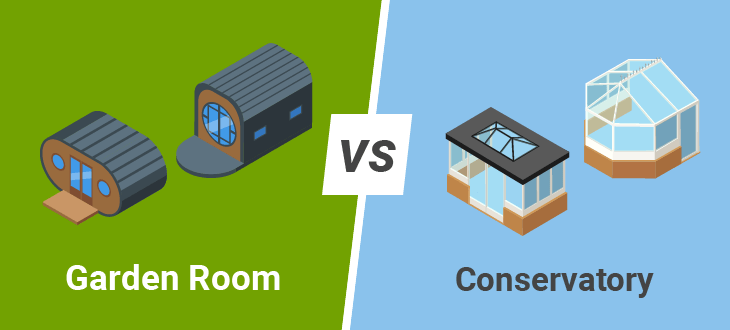
While both garden rooms and conservatories offer ways to extend your living space and connect with your garden, they have distinct characteristics that might better suit your needs and preferences.
Unlike conservatories, which are attached extensions to your home that prioritise light and connection to the outdoors, garden rooms are freestanding structures within your garden.
This allows for more design flexibility and better insulation options (typically, conservatories use more windows than a garden room; therefore, heat efficiency can vary). These points make a garden room more suitable for year-round use as a dedicated workspace, gym, or even a guest suite.
| Garden Room vs. Conservatory | ||
|---|---|---|
| Garden Room | Conservatory | |
| Location | A standalone structure built separately from your main house within your garden. | An attached structure directly linked to your existing house, typically built with a shared wall. |
| Function | Designed for year-round use and has good insulation and weatherproofing, which allows for a wider range of uses. | Traditionally designed to increase natural light and connection to the outdoors. While some conservatories can be insulated, they may not be as thermally efficient as a garden room. |
| Materials | Constructed from a variety of materials like timber, brick, or rendered walls, with a focus on insulation and weather resistance. Roofs can be tiled, flat, or feature skylights. | Predominantly built with glass walls and roofs to create a light-filled space. While modern conservatories incorporate advanced glazing and insulation, they may experience significant temperature fluctuations. |
Benefits of a garden room over a conservatory
While both options have perks, choosing between a garden room and a conservatory will largely depend on your needs. Both can offer additional space, but there are some significant benefits of a garden room you should consider:
-
Greater design flexibility
Freestanding in your garden, a garden room offers more design options in terms of size, shape, and materials. You're not restricted by having to match the existing style of your house.
-
Enhanced year-round use
Garden rooms are typically built with better insulation and weatherproofing compared to conservatories. This allows you to enjoy the space comfortably throughout the year, regardless of the season.
-
A wider range of uses
The improved insulation of a garden room makes it suitable for a variety of purposes beyond relaxation. For example, you can create a dedicated craft area, a workspace, or a gaming studio.
-
Potentially lower costs
Depending on the design and materials, a garden room might be a more cost-effective option than a conservatory. A conservatory would need advanced glazing and insulation measures for comfortable year-round use.
-
Simpler planning permission
Since garden rooms are separate structures, they often fall under less stringent planning regulations than conservatories, which may require adhering to stricter building codes.
Ultimately, the best choice depends on your specific needs and preferences. Consider your desired level of insulation, budget, and the primary function you envision for your new space. By understanding the key differences between a garden room and a conservatory, you can make an informed decision and create the perfect space.
Difference between a garden room and a shed?
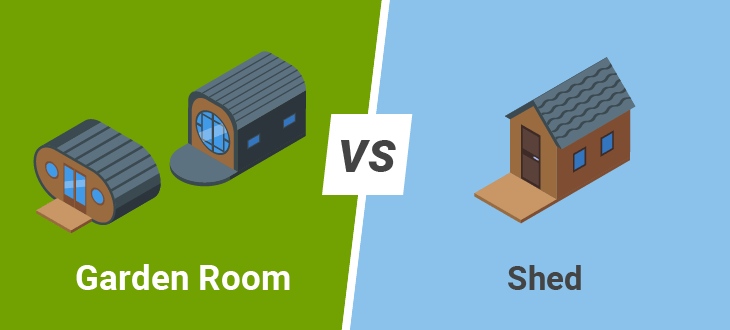
It’s a common misconception that garden rooms are just fancy sheds, and while both can be a valuable addition to your property, they serve very different purposes. Here's a breakdown to help you choose the perfect solution for your needs:
| Garden Room vs. Shed | ||
|---|---|---|
| Garden Room | Shed | |
| Function | Designed to be a dedicated, functional space that can be used in all seasons. | Primarily used for storage of tools, bikes, garden equipment, and anything else you need to keep organised or protected from the weather. |
| Comfort | Built with insulation and weatherproofing in mind, with optional features like heating and air conditioning to maintain a comfortable temperature. | Typically uninsulated and may not be weatherproofed to the same extent as a garden room. This makes them less suitable for prolonged use during poor weather conditions. |
| Materials | Constructed from a range of materials such as timber, brick, or rendered walls - they are made to be durable but stylish. | Often built with basic materials like wood or metal panels, they prioritise functionality over aesthetics. |
| Planning Permission | Some garden rooms may require planning permission, depending on size and design. It's always best to check with your local authorities before starting construction. | Many smaller sheds fall under permitted development, meaning you might not need formal planning permission. However, size restrictions and local regulations can vary, so you should confirm with your local council. |
Garden rooms offer a comfortable and versatile extension of your living space, while sheds provide a practical storage solution. Consider your primary needs – creating a dedicated, year-round usable space or simply storing outdoor equipment – to make an informed decision that best suits your requirements.
FAQ
A permanent, insulated structure in your garden that creates a comfortable extra living space. Garden rooms are used for home offices, gyms or hobby rooms.
Buying a pre-built garden room is usually cheaper and faster than building one from scratch. However, there are benefits to building a garden room, as you can tailor it specifically to your needs and taste.
In many cases, garden rooms do not require planning permission because they fall under ‘permitted development’ rights. However, you should always check with your local planning authority before undertaking any building work.
The average garden room cost is between £21,000 – £27,000, but this price will vary depending on the design, size, installer fees and chosen materials. It is recommended that you seek multiple installer quotes to find the best deal.

Becky is an experienced SEO content writer specialising in sustainability and renewable trends. Her background in broadcast journalism inspires reliable content to help readers live more sustainably every day.
We strive to connect our customers with the right product and supplier. Would you like to be part of GreenMatch?

